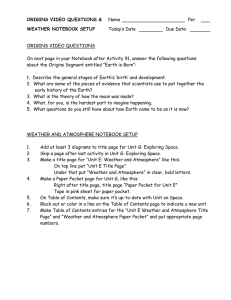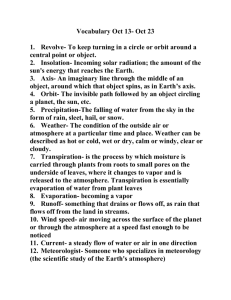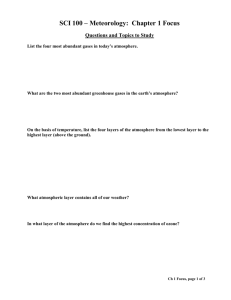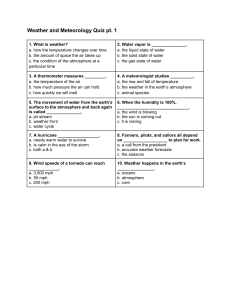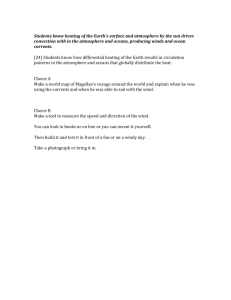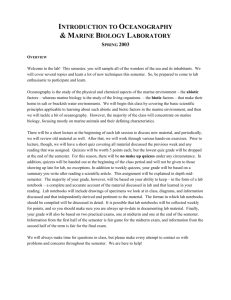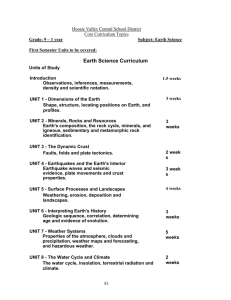Earth and Environmental Science
advertisement
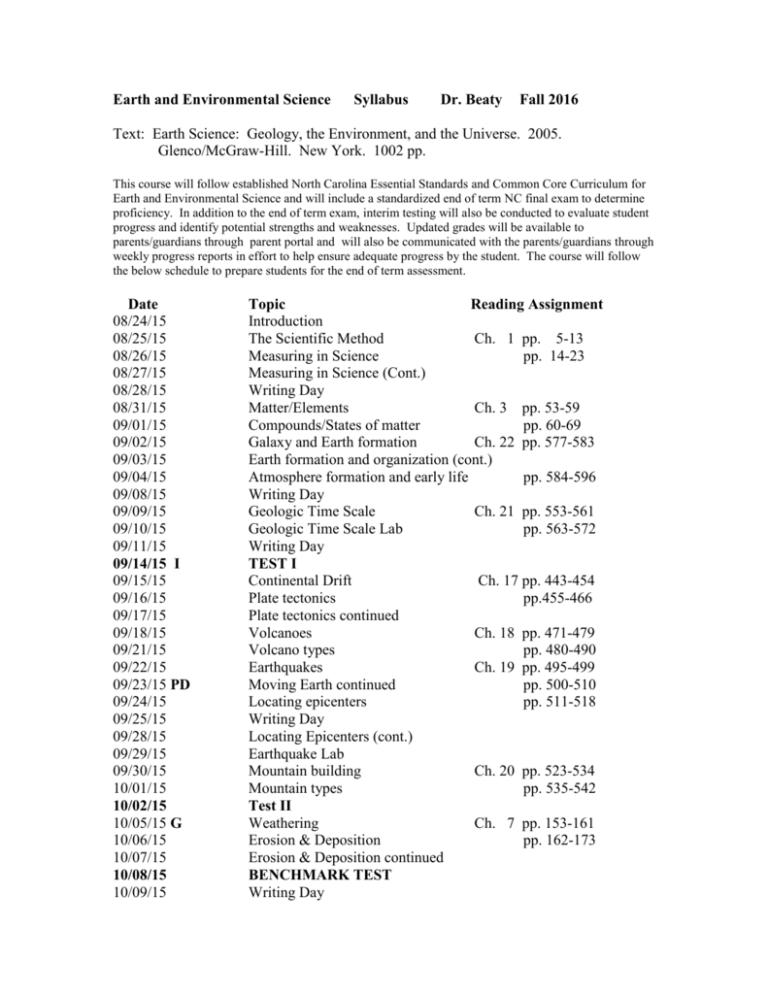
Earth and Environmental Science Syllabus Dr. Beaty Fall 2016 Text: Earth Science: Geology, the Environment, and the Universe. 2005. Glenco/McGraw-Hill. New York. 1002 pp. This course will follow established North Carolina Essential Standards and Common Core Curriculum for Earth and Environmental Science and will include a standardized end of term NC final exam to determine proficiency. In addition to the end of term exam, interim testing will also be conducted to evaluate student progress and identify potential strengths and weaknesses. Updated grades will be available to parents/guardians through parent portal and will also be communicated with the parents/guardians through weekly progress reports in effort to help ensure adequate progress by the student. The course will follow the below schedule to prepare students for the end of term assessment. Date 08/24/15 08/25/15 08/26/15 08/27/15 08/28/15 08/31/15 09/01/15 09/02/15 09/03/15 09/04/15 09/08/15 09/09/15 09/10/15 09/11/15 09/14/15 I 09/15/15 09/16/15 09/17/15 09/18/15 09/21/15 09/22/15 09/23/15 PD 09/24/15 09/25/15 09/28/15 09/29/15 09/30/15 10/01/15 10/02/15 10/05/15 G 10/06/15 10/07/15 10/08/15 10/09/15 Topic Reading Assignment Introduction The Scientific Method Ch. 1 pp. 5-13 Measuring in Science pp. 14-23 Measuring in Science (Cont.) Writing Day Matter/Elements Ch. 3 pp. 53-59 Compounds/States of matter pp. 60-69 Galaxy and Earth formation Ch. 22 pp. 577-583 Earth formation and organization (cont.) Atmosphere formation and early life pp. 584-596 Writing Day Geologic Time Scale Ch. 21 pp. 553-561 Geologic Time Scale Lab pp. 563-572 Writing Day TEST I Continental Drift Ch. 17 pp. 443-454 Plate tectonics pp.455-466 Plate tectonics continued Volcanoes Ch. 18 pp. 471-479 Volcano types pp. 480-490 Earthquakes Ch. 19 pp. 495-499 Moving Earth continued pp. 500-510 Locating epicenters pp. 511-518 Writing Day Locating Epicenters (cont.) Earthquake Lab Mountain building Ch. 20 pp. 523-534 Mountain types pp. 535-542 Test II Weathering Ch. 7 pp. 153-161 Erosion & Deposition pp. 162-173 Erosion & Deposition continued BENCHMARK TEST Writing Day 10/12/15 R 10/13/15 10/14/15 10/15/15 10/16/15 10/19/15 10/20/15 10/21/15 PD 10/22/15 10/23/15 10/26/15 I 10/27/15 10/28/15 10/29/15 10/30/15 11/02/15 11/03/15 11/04/15 11/05/15 11/06/15 11/09/15 11/10/15 11/12/15 11/13/15 11/16/15 11/17/15 G 11/18/15 11/19/15 11/20/15 11/23/15 11/24/15 R 11/30/15 12/01/15 12/02/15 12/03/15 12/04/15 12/07/15 12/08/15 12/09/15 12/10/15 12/11/15 I 12/14/15 12/15/15 12/16/15 12/17/15 12/18/15 Soils Development Soils (Cont.) Mass Movement Ch. 8 pp. 181-190 Wind pp. 191-197 Writing Day Glaciers pp. 198-206 Human Impacts on the Lithosphere Ch. 27 pp. 711-723 Test III Energy Resources Ch. 26 pp. 683-689 Writing Day Alternative resources pp. 690-697 Energy Conservation pp. 698-706 Surface Water Ch. 9 pp. 211-221 Lakes pp. 222-224 Writing Day Wetlands Groundwater Ch. 10 pp. 239-248 Groundwater systems pp. 249-260 Human Impacts on Freshwater Ch. 27 pp. 730-736 Test IV Physical Oceanography Ch. 15 pp. 385-398 Seawater pp. 397-406 Currents and Climate Writing Day Earth and moon system Ch. 28 pp. 753-757 Earth moon system continued pp. 758-769 Spectra and Stars Ch. 30 pp. 813-820 Stars continued pp. 821-828 Writing Day The sun’s composition pp. 805-812 Solar phenomenon The atmosphere Ch. 11 pp. 271-277 The atmosphere continued pp. 278-284 The atmosphere continued pp. 285-294 Test V Meteorology Ch. 12 pp. 299-319 Weather maps pp. 312-329 Weather mapping continued BENCHMARK TEST Storms: Thunderstorms/Tornados Ch. 13 pp. 329-340 Hurricanes pp. 341-346 Hurricanes in North Carolina pp. 347-354 Hurricane map Climate Ch. 14 pp. 359-368 Climate continued pp. 369-380 Global Climate Change 01/04/16 01/05/16 01/06/16 01/07/16 01/08/16 01/11/16 01/12-15/16 Human Impact on the Atmosphere Test VI Biomes Biomes (cont.) Review Review EXAMS Ch. 27 pp. 724-729 Grading: Grading will be as follows: Each homework, class work, quiz, or daily grade will be counted once per assignment; each test grade will be counted twice, and notebook, term paper, and/or project grades will be counted 3 times each. Expectations: All students must read to stay up with the class material [follow the above syllabus]. A notebook (~1 ½” 3 ringed binder is required) will be kept and include all class notes, notes from all the reading, defined vocabulary, and a record of all returned work with corrections attached. This notebook is cumulative and must be maintained upto-date and may be checked at any time. Students who are having difficulty or find themselves getting behind need to see me immediately and seek out additional tutorial help. Laptops: With the adoption of the 1:1 initiative, each incoming freshman student will receive a laptop computer for their use. It is required that each student bring the laptop to class each day. Several assignments and communications will be carried out through this digital medium and it must be maintained in working order for the student to be successful. Homework: In addition to the daily readings listed above, students will be assigned homework periodically but not every day. It is the student’s responsibility to have this work completed and turned in to the appropriate box on time [prior to the next class period!]. Any late work, if accepted, will be severely penalized!!! Honors Earth/Environmental Science: In addition to the course layout above, the honors Earth/Environmental Science course will have a marine science/oceanography focus component throughout this semester. Each student will be required to watch an online broadcast of a weekly seminar series held at Duke Marine Laboratories in Beaufort, NC. The topics will vary each week and be presented by top scientists in the field. Series of questions and discussions will be developed around this seminar series on a weekly basis. Participation in the discussions and writings are mandatory. Exposure to real scientists and their discussion of their work is valuable in showing students what science is all about. Furthermore, during this semester each student will pick a topic related to marine science/oceanography and write a 3-5 page term paper with appropriate format and citations. Details for the research paper will be given later in the semester.
